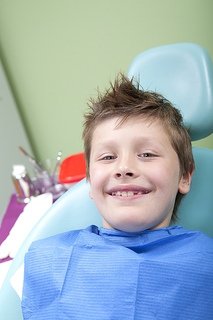
All Hallows’ Eve, more commonly known as Halloween, is a yearly event celebrated on October 31, and one that is anticipated by the young and young at heart all over the world. Some scholars claim that Halloween originated from Celtic festivals that honored the dead or that celebrated the harvest, while others doubt that there’s any connection at all to Samhain (a Gaelic harvest festival.) Regardless of its origin, our team at the orthodontic office of Dr. Wyatt hopes that Halloween is fun and enjoyed by all of our awesome patients!
Trick or treat?
In North America, Halloween is predominantly celebrated by children who dress up in costumes, which range from scary to cute, who then go around the neighborhood knocking on doors asking “trick or treat”, and they are given candy in return. Trick-or-treating is a time honored tradition, and though many parents groan at the pounds and pounds of candy collected by youngsters and fear for the health of their teeth, there are a few things you can do to help their teeth stay in great shape until the candy is gone:
Halloween Fun
Halloween isn’t just about gorging on candy; there are other events associated with this festive day including carving jack-o’-lanterns, painting pumpkins, decorating sugar cookies, bobbing for apples, going to haunted houses, or just curling up on the couch with a bowl full of popcorn and watching some classic, scary movies.
Halloween Around the World
Some countries, like Australia, frown upon Halloween, claiming it is an American event and not based in Australian culture, while others like Italy have embraced the fun and celebrate much as Canadians and Americans do. Mexicans have been celebrating this fun day since around 1960, and it marks the beginning of the Day of the Dead festival. Some countries in Europe have come late to the party, but since the 1990s, countries like Sweden, Norway, and Germany have started celebrating Halloween as well, and finding children in costumes or having ghosts hanging in windows has become commonplace.
Halloween is about fun; stepping outside our normal lives and donning a costume or gathering with friends to knock on doors and ask for candy is as much a part of our culture as hot dogs and barbecue on Labor Day. Have a safe and happy Halloween from the team at Wyatt Braces!

Many developing orthodontic problems can be intercepted and corrected if diagnosed and treated at an early age. Dr. Wyatt and our team at Wyatt Braces recommend children have their first orthodontic evaluation no later than age seven, or younger if the front four permanent teeth have replaced the baby teeth. Early treatment, also known as interceptive treatment or Phase I treatment, provides both timely detection of problems and greater opportunity for more effective treatment. Early intervention guides growth and development, preventing serious problems later.
If your child is showing these signs, it may be time to think about early orthodontic treatment:
Early intervention will greatly reduce the severity of your child’s case, and therefore reduce the length of treatment time and cost for a second phase of treatment when all of his or her permanent teeth have erupted. An evaluation at our Newport News office will determine if your child’s dental and skeletal growth is proceeding properly or if interceptive treatment is needed. Many times, a more severe problem can be corrected using sophisticated removable appliances instead of traditional orthodontic treatment.
To schedule a consultation for your child to visit with Dr. Wyatt, please give us a call! We will provide your child with an initial exam, and discuss with you the best steps to take toward caring for your child’s smile.

Temporomandibular dysfunction (TMD) refers to a diverse range of disorders that relate to muscular function in the jaw and face — the temporomandibular joint (TMJ). That could mean difficulty opening your mouth, pain in the jaw or face, or any sort of problem with the jaw joint.
TMD can be difficult to diagnose because of the varied causes. Whatever the case, an accurate diagnosis from Dr. Wyatt helps make treatment as successful as possible.
Most often, jaw problems will resolve themselves within several weeks or months. Surgeries like arthrocentesis, arthroscopy, and open-joint surgery should be a last resort. More conservative and reversible treatments should come first and are in fact the most critical step in the treatment of TMD.
Less invasive treatments like acupuncture and splints can be helpful, but that will depend on your particular case. It’s worth your while to speak with Dr. Wyatt at our Newport News office to learn about solutions that could work for you.
A combination of treatments will most often produce the greatest relief for TMJ patients. It’s a good idea to avoid activities that overuse the jaws, such as chewing gum or clenching your jaws.
You can be proactive in finding relief for TMD by trying the following remedies at home:

Fall can be a really enjoyable time of the year for you and your family. The kids are back in school, the leaves are changing, and Halloween approaches. This holiday is a lot of fun for kids, but Wyatt Braces wants to remind you it can also be risky, especially for your child’s braces. If you have kids with braces, take a look at the following tips from the American Association of Orthodontics (AAO) on how to keep your kids and their teeth safe this Halloween season.
Important Safety Tips
Trick-or-treating is a favorite Halloween activity for kids everywhere. While it is a great holiday tradition for children, it comes with some potential risks. To keep your kids safe while trick-or-treating, try following these simple guidelines:
Following these guidelines can help you keep your kids safe on Halloween.
Halloween Treats to Avoid if Your Child Has Braces
If your kids have braces, you’ll want them to steer clear of certain treats on Halloween. Many candies can cause damage to braces, so it’s wise to avoid them while you’re celebrating this fun holiday. Here is a list of treats to stay away from:
Some of these treats may seem harmless, but all of them have the potential to bend or break your child’s braces. So it’s best to avoid eating them altogether.
Braces-Friendly Halloween Treats
If your children have braces, they may feel like they can’t enjoy any treats on Halloween. However, there are plenty of braces-safe treat options for them to choose from, including the following:
These are just a few braces-friendly alternatives to traditional Halloween candy. Helping your kids have a fun and safe Halloween—while at the same time protecting their braces—can be easy if you follow these simple tips and guidelines. Help your kids enjoy the holiday without having to visit Dr. Wyatt for repair work on damaged braces!